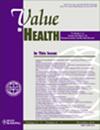Exploring Social Preferences for Health and Well-Being Across the Digital Divide: A Qualitative Investigation Based on Tasks Taken From an Online Discrete Choice Experiment
IF 4.9
2区 医学
Q1 ECONOMICS
引用次数: 0
Abstract
Objectives
Increasingly, discrete choice experiments (DCEs) are conducted online, with little consideration of the digitally excluded, who are unable to participate. Policy makers or others considering online research data need clarity about how views might differ across this “digital divide.” We took tasks from an existing online DCE designed to elicit social preferences for health and well-being outcomes. We aimed to explore (1) how telephone interview participants answered a series of choice tasks taken from an online DCE and (2) whether and how decision making for these tasks differed between digitally excluded and nonexcluded participants.
Methods
We conducted semistructured telephone interviews with members of the public (n = 27), recruited via an existing social research panel. Data were analyzed thematically to identify key approaches to decision making.
Results
Twelve participants were classed as “digitally excluded,” and 15 as “digitally nonexcluded.” Responses were similar between the 2 samples for most choice tasks. We identified 3 approaches used to reach decisions: (1) simplifying, (2) creating explanatory narratives, and (3) personalizing. Although these approaches were common across both samples, understanding the exercise seemed more challenging for the digitally excluded sample.
Conclusions
This novel study provides some assurance that the participants’ views over the choice tasks used are similar across the digital divide. The challenges we identified with understanding highlight the need to carefully examine the views held by the digitally excluded. If online data are to inform policy making, it is essential to explore the views of those who cannot participate in online DCEs.
跨越数字鸿沟,探索社会对健康和幸福的偏好。基于在线离散选择实验任务的定性调查。
目标:离散选择实验 (DCE) 越来越多地在网上进行,但却很少考虑到被数字技术排除在外、无法参与实验的人。政策制定者或其他考虑在线研究数据的人需要清楚地了解,在这种 "数字鸿沟 "中,人们的观点会有什么不同。我们从现有的在线 DCE 中选取了一些任务,该在线 DCE 旨在了解社会对健康和福利结果的偏好。我们的目的是探索:i) 电话访谈参与者如何回答取自在线 DCE 的一系列选择任务;ii) 数字排斥和非数字排斥参与者对这些任务的决策是否不同以及如何不同:方法:通过现有的社会研究小组对公众(n=27)进行半结构化电话访谈。对数据进行了主题分析,以确定决策的关键方法:结果:12 名参与者被归类为 "数字排斥",15 名参与者被归类为 "数字非排斥"。两个样本对大多数选择任务的回答相似。我们确定了做出决定的三种方法:(1) 简化;(2) 创建解释性叙述;(3) 个性化。虽然这些方法在两个样本中都很常见,但对于被数字排斥的样本来说,理解这项工作似乎更具挑战性:这项新颖的研究在一定程度上保证了参与者对所使用的选择任务的看法在数字鸿沟中是相似的。我们在理解方面发现的挑战突出表明,有必要谨慎研究被数字鸿沟排斥者所持有的观点。如果要让在线数据为政策制定提供信息,就必须探讨那些无法参与在线 DCE 的人的观点。
本文章由计算机程序翻译,如有差异,请以英文原文为准。
求助全文
约1分钟内获得全文
求助全文
来源期刊

Value in Health
医学-卫生保健
CiteScore
6.90
自引率
6.70%
发文量
3064
审稿时长
3-8 weeks
期刊介绍:
Value in Health contains original research articles for pharmacoeconomics, health economics, and outcomes research (clinical, economic, and patient-reported outcomes/preference-based research), as well as conceptual and health policy articles that provide valuable information for health care decision-makers as well as the research community. As the official journal of ISPOR, Value in Health provides a forum for researchers, as well as health care decision-makers to translate outcomes research into health care decisions.
 求助内容:
求助内容: 应助结果提醒方式:
应助结果提醒方式:


